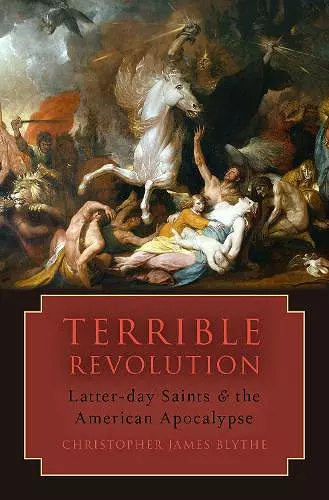Terrible Revolution
Latter-day Saints and the American Apocalypse
Christopher James Blythe author
Format:Hardback
Publisher:Oxford University Press Inc
Published:13th Aug '20
Currently unavailable, and unfortunately no date known when it will be back
This hardback is available in another edition too:
- Paperback£20.99(9780197695159)

The relationship between early Mormons and the United States was marked by anxiety and hostility, heightened over the course of the nineteenth century by the assassination of Mormon leaders, the Saints' exile from Missouri and Illinois, the military occupation of the Utah territory, and the national crusade against those who practiced plural marriage. Nineteenth-century Latter-day Saints looked forward to apocalyptic events that would unseat corrupt governments across the globe, particularly the tyrannical government of the United States. The infamous "White Horse Prophecy" referred to this coming American apocalypse as "a terrible revolution… in the land of America, such as has never been seen before; for the land will be literally left without a supreme government." Mormons envisioned divine deliverance by way of plagues, natural disasters, foreign invasions, American Indian raids, slave uprisings, or civil war unleashed on American cities and American people. For the Saints, these violent images promised a national rebirth that would vouchsafe the protections of the United States Constitution and end their oppression. In Terrible Revolution, Christopher James Blythe examines apocalypticism across the history of the Church of Jesus Christ of Latter-day Saints, particularly as it took shape in the writings and visions of the laity. The responses of the church hierarchy to apocalyptic lay prophecies promoted their own form of separatist nationalism during the nineteenth century. Yet, after Utah obtained statehood, as the church sought to assimilate to national religious norms, these same leaders sought to lessen the tensions between themselves and American political and cultural powers. As a result, visions of a violent end to the nation became a liability to disavow and regulate. Ultimately, Blythe argues that the visionary world of early Mormonism, with its apocalyptic emphases, continued in the church's mainstream culture in modified forms but continued to maintain separatist radical forms at the level of folk-belief.
Certainly, the book reveals a rich lode of apocalypticism that persists and changes within religious traditions that lay claim to be the restoration of all things prior to the earth's final dispensation. In so doing, it invites promising further work by scholars of religious futurism. * Tona Hangen, BYU Studies Quarterly *
Blythe's Terrible Revolution offers a smart, original, and compelling analysis of the evolving role of apocalyptic thinking in the LDS Church. In this impressively researched and important book, Blythe has marshalled thousands of sources, some long hidden away in obscure places, and diligently connected them to larger social and political trends. He demonstrates that we cannot understand the rise, growth, and success of Mormonism without taking seriously its apocalyptic origins and proclivities. * Matthew Avery Sutton, Mormon Studies Review *
It is when he begins to explore understudied material... that this book really starts to break new ground and offer not simply new history, but new perspectives on the trajectory of the new religious movement that Joseph Smith founded. * Matthew Bowman, Claremont Graduate University, Journal of Mormon History *
Blythe's most admirable achievement with this volume is his ability to provide a fascinating, easily accessible, but still truly academic, thoroughly researched, and meticulously presented cultural and social history of the Latter-day Saints in the United States, structured around the theme of the apocalypse ... I wholeheartedly recommend Terrible Revolution. * Iren E. Annus, Nova Religio *
...this volume is a unique contribution to the literature on American religious history. Highly recommended. Upper-division undergraduates through faculty. * D. S. Azzolina, CHOICE *
The title may include "Terrible," but this book is anything but. It is a unique contribution to understanding the history, theology, and folklore surrounding the much-anticipated end times through the eyes of the church and its lay members. * Kevin Folkman, Association For Mormon Letters *
Terrible Revolution was one of the most exciting and well-researched books I've read in a while. It is a book that you want to complete in one sitting, but don't. Instead, you show restraint and space out the reading because you want to savor the history and enjoy it a moment longer. * Christopher Angulo, Association of Mormon Letters blog *
The Latter-day Saints of the nineteenth century belonged to an apocalyptic tradition, argues historian and folklorist Christopher Blythe in his highly informative book Terrible Revolution....Blythe charts the rise and fall of Mormon apocalyptic discourse over the two-hundred- year history of the Restoration. He defines "apocalyptic" as "the belief that society was headed toward cataclysmic events that would uproot the current social order in favor of a divine order that would be established in its place". * Patrick Q. Mason, Journal of Book of Mormon Studies *
Terrible Revolution contributes significantly to religious studies by showcasing how apocalypticism shapes and reflects communal identities. It will interest scholars of American religion, folklore, and millenarianism, as well as those curious about the intersections of faith and culture. For those deeply engaged in these fields, Blythe's work is indispensable. * Tianji Ma, Religious Studies Review *
- Winner of Winner, 2021 Best First Book Award, Mormon History Association.
ISBN: 9780190080280
Dimensions: 150mm x 236mm x 25mm
Weight: 612g
348 pages